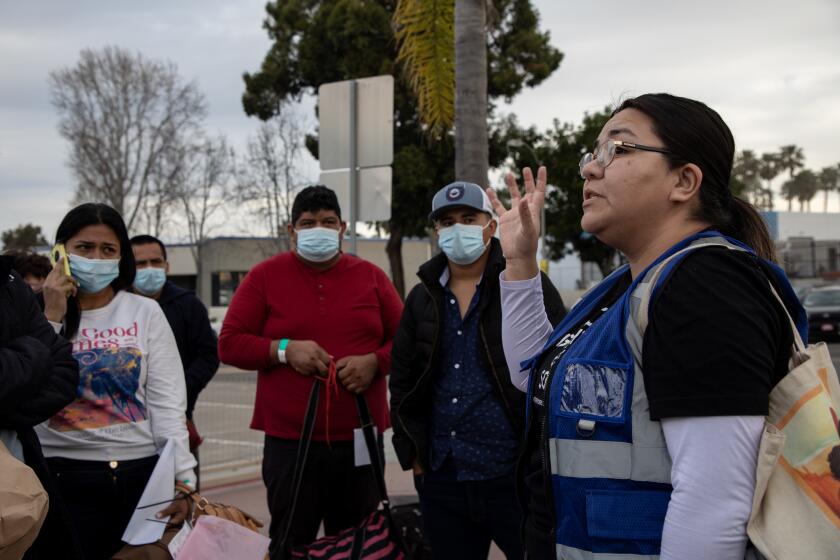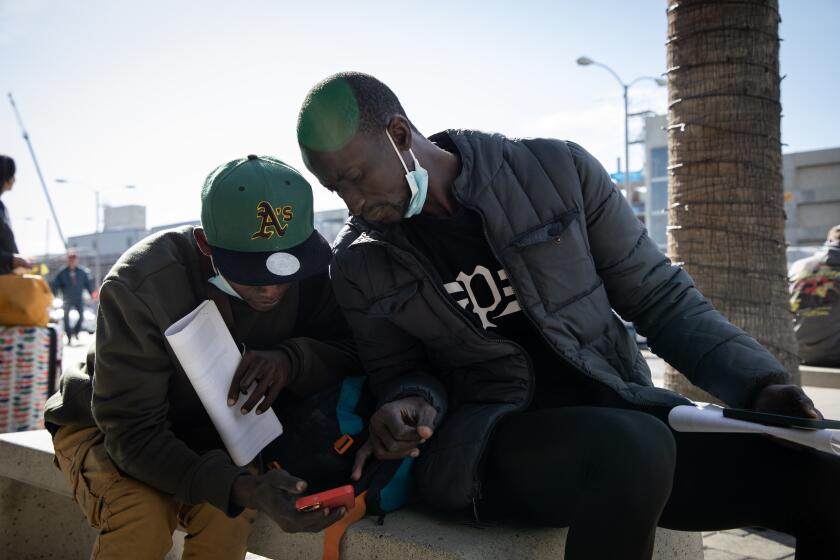Deported veterans want to return to U.S.
They served their country and made what many Americans consider to be a significant sacrifice by joining the armed forces.
After their discharge, they might expect medical care and a stable future in the United States. But when veterans who are not U.S. citizens run afoul of the law, they can face a serious consequence that deprives them of both: deportation.
The situation for these deported veterans, many of whom are living in Tijuana, raises a legal and moral conundrum, say their advocates. Should noncitizen veterans who commit crimes be deported, despite putting their lives at risk for U.S. interests, or does their military service give them a permit to stay? And what severity of offenses should be punishable with deportation?
The circumstances that lead to deportation are typically varied. In a few cases, people were in the country illegally before enlisting, but the vast majority had permanent residence. Some committed crimes as teenagers or young men, and others encountered troubles after their discharge. Crimes that can lead to deportation under federal law include drug trafficking, murder and drunken driving, among a long list.
It is impossible to know the exact number of deported veterans, because federal agencies do not track which deportees have served in the military.
Representatives of U.S. Immigration and Customs Enforcement in San Diego, as well as the Departments of Veterans Affairs and Homeland Security, and two congressional committees in Washington said they don’t keep track or didn’t respond to requests for information.
According to the federal government, any veteran who is told the leave the U.S. has committed a serious crime.
In a statement, Immigration and Customs Enforcement said deportations of veterans go through several steps of review: “U.S. Immigration and Customs Enforcement (ICE) is very deliberate in its review of cases involving veterans. Any action taken by ICE that may result in the removal of an alien with prior military service must be authorized by the senior leadership in an ICE field office, to include an evaluation by local counsel.”
According to a report by American Progress, which calls itself a nonpartisan educational institute, more than 710,000 immigrants were naturalized through military service between 1907 and 2010. The report cited a statistic from the Department of Defense that 24,000 noncitizen immigrants served in the military in 2012.
Hector Barajas, a deported veteran in Tijuana, said many veterans think they are citizens, because military recruiters promise citizenship to permanent residents, and the oath of enlistment is similar to the oath of naturalization.
“You’re a citizen if you served,” is a common misconception among his noncitizen veteran acquaintances, he said.
Willie Hager, who served two tours in Vietnam with the Marine Corps, said the plight of deported veterans is a symptom of a broader disregard for former service members.
“It’s an extension of what happened to us with Vietnam. We came back and nobody wanted anything to do with us. And we had to fight for every single thing that we had,” Hager said.
Today, the Department of Veterans Affairs is much more helpful than previously, Hager said. Still, he believes that veterans who are deported miss out on care that is their due.
“They thought they were going to fight for freedom and democracy, and they get back and lose theirs,” he said. “From our perspective, there’s a lot of anger about that. In our eyes and in our hearts, they are our brothers and sisters.”
The counterargument
Critics say that people who commit serious crimes deserve to be deported.
“With so many people wishing to immigrate to the U.S., why should we put up with those who have proven themselves to be unwilling to obey our laws,” said former federal prosecutor Pete Nuñez, whose cases included federal immigration violations for 16 years.
In an email interview, Nuñez said that deporting people for certain offenses is as old as the nation’s first immigration restrictions, which date back to the 1880s.
“The theory was — and is — that we allow people to come here according to our laws, and under certain conditions, and if you violate any of those conditions, you are no longer welcome,” Nuñez wrote.
Several weeks ago, President Barack Obama issued an executive order that will grant a temporary reprieve to certain individuals who are in the country without authorization. Veterans who have been deported were not included in his order.
Nuñez agreed with that decision. Veterans, he said, erase their contributions to the country by committing crimes after being discharged.
“The fact that they served in the military, then got out of the military and committed one or more deportable crimes, cancels out their military service,” he wrote.
Window into their world
Whenever a newly deported veteran is sent to Tijuana, he’s likely to meet Barajas.
Barajas, 37, was born in Mexico and came to the U.S. as a child. He served in the Army’s 82nd Airborne Division from 1994 to 2001 and was honorably discharged.
In 2004, he was deported after serving about two years in prison for firing a weapon into a car. (He declined to give details but said “nobody was hurt.” Based on his lawyer’s advice, he declined to sign a privacy waiver that would have given the government a chance to discuss his case.)
Since then, he’s become a champion of this population, in Tijuana and beyond, through a group he leads, Banished Veterans. “I’ve come into contact with veterans who have been deported to 23 different countries since 1996, from the Vietnam War to current Iraq and Afghanistan wars,” he said in a recent interview.
Last January, Barajas set up a shelter in Tijuana that houses up to 15 homeless veterans. He named it the bunker. He spends his days helping veterans there get services like rehabilitation and psychological counseling. He’s always looking for volunteer dentists, physical therapists and mental health professionals.
He thinks veterans are struck with a type of “double jeopardy,” because they sacrifice once to go to battle for the U.S., and then again when they are faced with punishments more harsh than what a U.S citizen would get for the same crime. “We paid our debt to society,” he said.
Barajas felt frustrated recently when Andrew Tahmooressi, the U.S. Marine veteran who was jailed for taking banned weapons into Mexico, was allowed to return to the United States. The reason: His lawyer argued Tahmooressi couldn’t get treatment for his post-traumatic stress disorder.
Barajas says veterans can’t get treatment in Tijuana, but unlike Tahmooressi, they cannot return to the U.S. for care. “It’s not right,” Barajas said. It’s also hard for them to receive benefits, since they can’t make it to meetings in the U.S.
However, Barajas said, after they die, deported veterans can be buried at military cemeteries. “It just makes no sense” to be kept away until death, he said.
Pursuing legislation
Rather than wait for another executive order to include these veterans, immigration attorney Margaret Stock is pushing for new federal legislation.
The country’s immigration code now has a lengthy list of offenses that are punishable by deportation. These include major crimes but also many minor ones, she said.
A problem with the current law is that, depending on the way prosecutors decide to charge a crime, the same misdeed may or may not lead to deportation. And certain crimes on the list are not as severe as others. For example, some crimes don’t lead to any jail time but they still lead to deportation, she said.
She’s been collaborating with lawmakers in Washington to draft a bill to change that immigration law. Their aim is to reduce these ambiguities and make veterans deportable only for serious crimes that resulted in substantial jail sentences.
This change would be a way of ensuring that dangerous people are deported, while giving a second chance to veterans who committed less-serious crimes, yet who have the potential to become productive members of society in America, Stock said.
Get Essential San Diego, weekday mornings
Get top headlines from the Union-Tribune in your inbox weekday mornings, including top news, local, sports, business, entertainment and opinion.
You may occasionally receive promotional content from the San Diego Union-Tribune.




